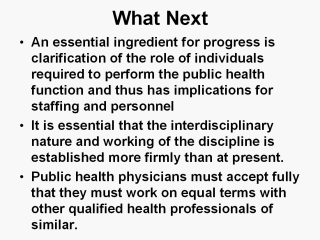| front |1 |2 |3 |4 |5 |6 |7 |8 |9 |10 |11 |12 |13 |14 |15 |16 |17 |18 |19 |20 |21 |22 |23 |24 |25 |26 |27 |review |
 |
An essential ingredient
for progress is clarification of the role of individuals required to perform
the public health function and thus has implications for staffing and
personnel. Many of the interdisciplinary tensions within public health arise
from lack of clarity about the nature of expertise and false beliefs about
the abilities of different professional groups. As we have already
emphasized, to fulfill some of the service requirements medically qualified
public health physicians are needed. Medical knowledge and skills are
essential, in particular, in the control, surveillance and prevention of
diseases, both infectious as well as chronic. Medical expertise is also
required in the assessment, evaluation and planning of clinical care
requirements, and is helpful for the co-ordination of activities and
policies with hospital and general practice clinicians. If public health is to play the wider role envisaged, it is essential that the interdisciplinary nature and working of the discipline is established more firmly than at present. In the investigation of an outbreak of infectious disease for example, the consultant in communicable disease control has to work with microbiologists and with environmental health officers trained in environmental investigation and control. To devise appropriate programs of health promotion for a school, public health workers must be trained in education, psychology and sociology. Medical statisticians are important for design of investigations and the successful analysis and interpretation of data. Only if public health physicians accept fully that they must work on equal terms with other qualified health professionals of similar status will it be possible to achieve the crucial development and application of policies that can improve the populationís health. The proposals also have implications for the often uneasy interface between service and academic public health. Part of this is a result of the different emphasis of these two branches of the specialty. Academics can seem indifferent about the practical application of findings and some appear to consider that some service preoccupations are mundane in comparison with the development of knowledge. Similarly, the service side has sometimes seemed preoccupied with day-to-day problems and unwilling to invest in research efforts without an immediate pay-off. |